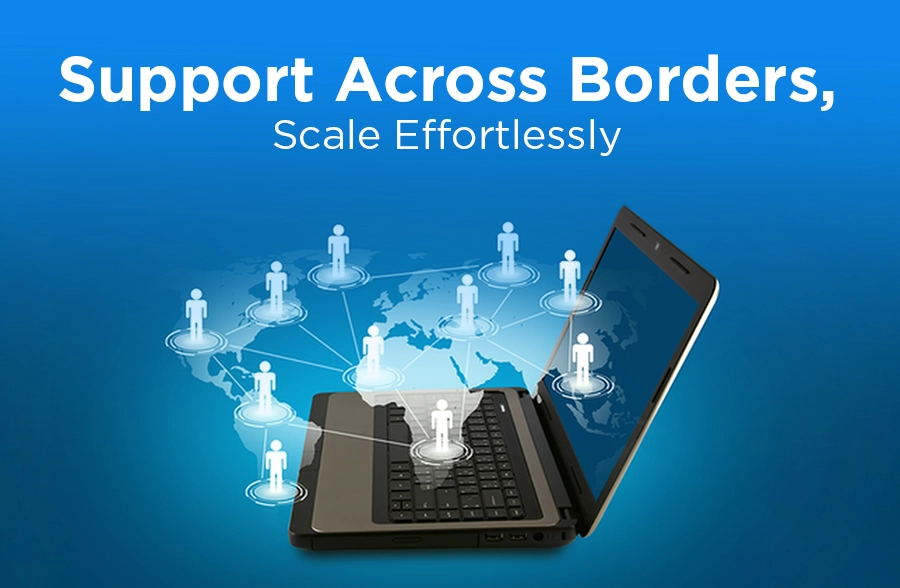Schedule a FREE call with our outsourcing expert now and get a precise quotation that meets your requirements. Don't wait - get started today!
Many companies outsource service providers to handle tasks outside their primary business. But what exactly does an outsourcing service provider do, and how can it help your business? This guide explains what outsourcing service providers are, the types of services they offer, and how they help companies operate more efficiently.
What Is an Outsourcing Service Provider?
An outsourcing service provider is a company that offers specialized services to other businesses, taking over tasks that are typically non-core to the client’s operations. These tasks include anything from customer service to IT support, data entry, or even human resource functions. Companies hire outsourcing providers instead of managing these services in-house to save time and money.
Outsourcing providers often have teams with specific skills and expertise, enabling them to perform tasks more efficiently and at a lower cost. This allows businesses to focus on what they do best while leaving the outsourced functions to professionals.
The Evolution of Outsourcing Services
The concept of outsourcing has been introduced previously. Businesses have been outsourcing tasks for decades, but the scope and scale have grown significantly in recent years. Initially, outsourcing was limited to simple processes like payroll or basic data entry. Today, outsourcing providers handle complex operations like software development, digital marketing, and customer relationship management.
The rise of technology and the internet has made outsourcing more accessible to businesses of all sizes. Small and medium-sized enterprises (SMEs) can now compete with more giant corporations by outsourcing critical tasks to providers with specialized expertise, gaining access to a global talent pool without the high costs of maintaining large in-house teams.
Types of Outsourcing Services
Several types of outsourcing services are available, depending on the company’s specific needs. Here are some of the most common:
- Customer Service Outsourcing Many companies outsource customer service operations to call centers. These call centers can manage customer inquiries, complaints, and support requests, providing businesses a cost-effective way to maintain customer satisfaction. Outsourcing customer service also allows companies to offer 24/7 support without staffing internal teams around the clock.
- Human Resource Outsourcing Tasks such as payroll management, recruitment, and employee training can be time-consuming. By outsourcing these human resource functions, companies can reduce administrative burdens and focus on core activities. This improves efficiency and helps companies stay compliant with employment laws and regulations.
- IT and Technical Support IT outsourcing is one of the most popular services businesses rely on. It involves hiring third-party providers to manage technical support, system maintenance, and cybersecurity. This is particularly important for companies that handle sensitive data, as outsourcing IT functions ensures that they are in the hands of experts who prioritize data security.
- Business Process Outsourcing (BPO) BPO covers various back-office functions such as data entry, accounting, and supply chain management. These services help businesses streamline operations and reduce costs, especially for repetitive tasks that do not require in-house expertise.
- Finance and Accounting Outsourcing Many companies outsource their finance and accounting processes, such as tax preparation, bookkeeping, and financial reporting. By outsourcing these tasks, companies can ensure accuracy and compliance while reducing the risk of errors.
- Outsourcing in Marketing Businesses can also outsource marketing tasks such as digital advertising, content creation, and social media management. This allows them to reach a larger audience without the need for an in-house marketing team. Outsourcing marketing services ensures that businesses can keep up with the latest trends and strategies in digital marketing.
Industries That Commonly Use Outsourcing Services
While almost any business can benefit from outsourcing, some industries rely heavily on outsourcing providers to manage their operations. Here are a few examples:
- Healthcare The healthcare industry often outsourced billing, medical transcription, and customer service. Outsourcing allows healthcare providers to focus on patient care while reducing the administrative load. It also ensures that medical billing and compliance experts handle sensitive data securely.
- Retail businesses frequently outsource customer service and supply chain management. This enables them to handle high customer inquiries during busy seasons and streamline logistics for faster delivery.
- Finance Financial institutions often outsource back-office tasks like data processing, compliance reporting, and customer support. By outsourcing these functions, financial firms can ensure accuracy, reduce costs, and improve turnaround times.
- Technology Tech companies frequently outsource software development, app development, and IT support. This gives them access to specialized expertise and allows them to focus on innovation while leaving routine tasks to outsourcing providers.
Benefits of Outsourcing for Businesses
Outsourcing offers a wide range of benefits for businesses. Here are some of the key advantages:
- Cost Savings Outsourcing helps companies reduce operational costs by avoiding the expenses of hiring, training, and managing full-time employees. By outsourcing specific tasks, companies only pay for the needed services, which can result in significant cost reductions.
- Increased Efficiency Outsourcing providers are often specialists in their field, which means they can complete tasks more quickly and accurately than in-house teams. This improves overall efficiency and allows businesses to meet manageable deadlines for their staff.
- Access to Expertise One main reason companies outsource is to gain access to a global talent pool. Outsourcing providers employ experts in various fields, from software development to customer service. This gives businesses access to top-tier talent without the overhead costs of building an in-house team.
- Scalability As businesses grow, their needs may change. Outsourcing provides the flexibility to scale services up or down as required. For example, during peak seasons, a business can increase its customer support capacity by outsourcing more agents without the long-term commitment of hiring full-time employees.
- Focus on Core Competencies By outsourcing non-core activities, businesses can focus on their primary objectives. For instance, a tech company may choose to outsource HR and customer service tasks so it can dedicate more resources to product development and innovation. This focus on core competencies can give companies a competitive advantage in their industry.
- Improved Turnaround Times Outsourcing helps businesses complete tasks more quickly, improving overall turnaround times. For example, outsourcing customer service to a dedicated call center ensures customer inquiries are handled promptly, leading to higher satisfaction and loyalty.
How to Choose the Right Outsourcing Service
Choosing the right outsourcing service provider is crucial for a successful partnership. Here are some factors to consider:
- Experience and expertise Look for providers with a proven track record in the industry. Experienced providers will understand your business needs and be able to offer tailored solutions. For example, Magellan Solutions has over 18 years of experience providing outsourcing services to various industries, including healthcare, retail, and finance.
- Cost vs Value While cost savings are a significant benefit of outsourcing, balancing cost with the Value provided is essential. The cheapest provider may only sometimes be the best option. Look for a provider that offers a combination of affordability and high-quality service.
- Data Security If you’re outsourcing tasks that involve sensitive data, such as customer information or financial records, ensure that the provider follows strict security protocols. A reliable provider will have robust cybersecurity measures in place to protect your data.
- Communication Effective communication is vital for a successful outsourcing partnership. Make sure the provider offers clear lines of communication, regular updates, and transparency in their processes.
- Scalability Choose a provider that can scale their services to meet your business’s growing needs. Whether you want to expand customer service capacity or outsource additional tasks, the provider should be flexible enough to adapt to your changing requirements.
Conclusion: Outsourcing with Magellan Solutions
Outsourcing allows businesses to streamline operations, reduce costs, and access specialized expertise. Whether you need customer service support, IT assistance, or human resource management, outsourcing service providers offer solutions to help your business thrive.
Magellan Solutions, a leading outsourcing service provider, offers personalized services designed to meet each client’s unique needs. With over 18 years of experience, Magellan Solutions ensures that businesses can achieve their goals by providing efficient, cost-effective, and reliable outsourcing services. Ready to grow your business? Contact Magellan Solutions today to learn how outsourcing can drive your success.
Magellan Solutions has been helping SMEs optimize their operations for over 19 years. Our AI lead generation services are designed to help you find qualified leads, automate the lead generation process, and provide your sales and marketing teams with actionable insights. By outsourcing with us, you gain access to the best AI tools without the high costs of in-house implementation.
Book your FREE 60-minute business consultation today, and let’s strategize how to elevate your lead generation efforts—NO COMMITMENTS, just results-driven insights!















